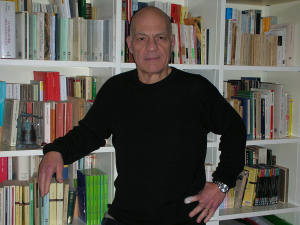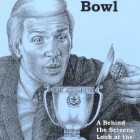 Two weeks ago I started a class of bridge at Ascoli Piceno’s Circolo Cittadino (City Club); my three pupils, Cinzia, Giampaolo and Valentina didn’t know anything of the game, it was their very first time at the table. I dealt a deck, turning up the last card, and I started to explain the Whist. I pointed out that it needed to carefully watch and remember any card. Later, at home, I received an email from Giampaolo; he wrote about card memorizing and asked me:
Two weeks ago I started a class of bridge at Ascoli Piceno’s Circolo Cittadino (City Club); my three pupils, Cinzia, Giampaolo and Valentina didn’t know anything of the game, it was their very first time at the table. I dealt a deck, turning up the last card, and I started to explain the Whist. I pointed out that it needed to carefully watch and remember any card. Later, at home, I received an email from Giampaolo; he wrote about card memorizing and asked me:
…Are there techniques to develop some specific memory?… Could be possible to make a choice of what might be more useful to memorize?
In my opinion, Giampaolo’s asking dealt with a main key of bridge thinking, and it deserved many responses, not one only; therefore I forwarded it to others. Today the responses from Norberto Bocchi, Michael Becker, Michael Rosenberg, John Swanson and Silvio Sbarigia.
 Norberto Bocchi – I think the memory only develops with practice and the Godsend, I honestly the cards I remember all them without any effort, that is I store them in the mind in automatic way.
Norberto Bocchi – I think the memory only develops with practice and the Godsend, I honestly the cards I remember all them without any effort, that is I store them in the mind in automatic way.
Michael Becker – To be honest I don’t remember how I remember! Remembering the cards came to me after playing hundreds, then thousands of hands. I started playing bridge when I was 13 years old. Two years later, while I was playing a hand I could remember all the cards played. And I could remember all the hands from a 26 board session for at least a day. Now I am 70 years old. I occasionally miss a spot card played. I cannot remember all the hands from a session without a little help. Hand records are great!
– To be honest I don’t remember how I remember! Remembering the cards came to me after playing hundreds, then thousands of hands. I started playing bridge when I was 13 years old. Two years later, while I was playing a hand I could remember all the cards played. And I could remember all the hands from a 26 board session for at least a day. Now I am 70 years old. I occasionally miss a spot card played. I cannot remember all the hands from a session without a little help. Hand records are great!
 Michael Rosenberg – I happen to have an excellent memory, but don’t use any techniques. I understand that there are memory competitions, and these people use ‘memory palaces.’ But I don’t think I can personally help you much – I am just lucky that I have this talent.
Michael Rosenberg – I happen to have an excellent memory, but don’t use any techniques. I understand that there are memory competitions, and these people use ‘memory palaces.’ But I don’t think I can personally help you much – I am just lucky that I have this talent.
 John Swanson – I am a bridge expert but not a memory expert; I have no good understanding of how memory works. About 60 years ago I went to a lecture on how one develops a method for remembering, but I don’t remember much about it. I would guess that you will get a much better answer if you pose your questions to a memory expert.
John Swanson – I am a bridge expert but not a memory expert; I have no good understanding of how memory works. About 60 years ago I went to a lecture on how one develops a method for remembering, but I don’t remember much about it. I would guess that you will get a much better answer if you pose your questions to a memory expert.
 Silvio Sbarigia – In my opinion memorizing is a skill that is part of the card-player’s talent, that is automatically watching the cards and immediately setting the vision of them into the memory. I have always had such a skill. But if a student would learn to count opponents’ hand, he should start at once a method of picturing to himself the hidden cards, and, therefore, he would also improve the mnemonic part of inserting the plugs, i.e. the cards themselves, and with a lot of patience also improving the ability to remember the cards already played. But this isn’t worth for all. If he want to become at least good player he have to toil in order to train that part of memory which he is not even aware of having. Besides, it is better to learn basic techniques and percentages, and not to go too much soon at the table, which is backfiring because the student might think that the game were too much difficult and being dismayed. And it also must be held that bridge is paining and studying. Because the bridge isn’t a joke. It is a whole of logic, psychology, character, politeness, and more.
Silvio Sbarigia – In my opinion memorizing is a skill that is part of the card-player’s talent, that is automatically watching the cards and immediately setting the vision of them into the memory. I have always had such a skill. But if a student would learn to count opponents’ hand, he should start at once a method of picturing to himself the hidden cards, and, therefore, he would also improve the mnemonic part of inserting the plugs, i.e. the cards themselves, and with a lot of patience also improving the ability to remember the cards already played. But this isn’t worth for all. If he want to become at least good player he have to toil in order to train that part of memory which he is not even aware of having. Besides, it is better to learn basic techniques and percentages, and not to go too much soon at the table, which is backfiring because the student might think that the game were too much difficult and being dismayed. And it also must be held that bridge is paining and studying. Because the bridge isn’t a joke. It is a whole of logic, psychology, character, politeness, and more.
***
Memorizing at Bridge – by Paolo Enrico Garrisi
Part 7: “Practice and Talent”
- Part 6: Doris Fischer and Margit Schwarz »
- Part 5: Giorgio Duboin and Mark Horton »
- Part 4: “Exercises”»
- Part 3: “Shortcuts”»
- Part 2: “An obsessive counter” »
- Part 1: “A trick tells a story”